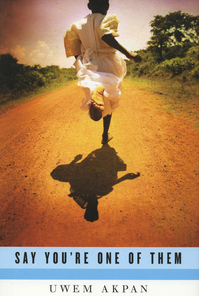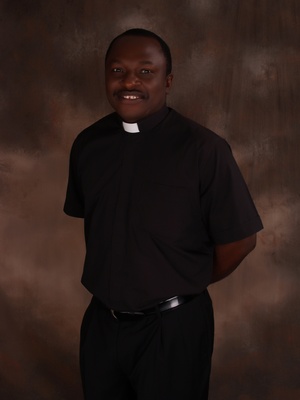Uwem Akpan discusses his Oprah-anointed book on Friday at University of Michigan

If that title rings a bell, it just might be because Oprah Winfrey recently chose the collection for her book club. So while Akpan now makes his home in Ilasamaja-Lagos, Nigeria, serving a parish of Christ the King Church, he was in New York for a book tour on Wednesday when he answered questions from AnnArbor.com by e-mail.

A: As (Oprah) said in one of her video blocks, she called me after reading (the story) "Fattening for Gabon." I was at my parish in Lagos, Nigeria. It was unbelievable. What are the chances that Oprah will call you in this life, you know what I mean? I was so excited yet so humbled and awed. Is-this-for-real kind of feeling. Even more so if you consider the fact that Oprah has never picked a short story collection!

Q: 
Has the attention been overwhelming? A: I say, it has been incredible. I never knew this could ever happen to me. (Oprah choosing your book) is one of those things you cannot even dream of. … I actually feel that now if I write another book, I would not lack publishers — not that anyone ever rejected my short story manuscript, thanks to two short stories in The New Yorker! I am so thankful to God. Though it is so tasking doing the book tours, it is better than shopping around with a manuscript. 


Q: What appeals to you about the short story form? A: I wanted a medium that would allow me go to many of the conflicts in Africa and write as if I experienced them. I just wanted to talk about the conflicts, the tragedies, things that bothered me. I just wanted all of this in one collection. 


Q: Short story collections normally don't get the sales numbers that novels and
 non-fiction works do. Why do you think it's a less popular medium in 
America? A: It is not only in America. People generally buy novels, not short story collections. The first time I bought a collection was when I began to write fiction! Do you see what I mean? I think the problem is that the reader finds it difficult to reinvest in another set of characters and terrain every few pages! Many readers want to stay with characters longer, get to know them and get to explore many facets of their lives. 


Q: How/why did you choose this title for your collection? A: Blame it on my editor! My first title was "Fattening for Gabon," the second story in the collection. I thought that was a very unique title, but my editor did not like it very much. When I stalled, she volunteered to come up with possibilities. "Say You're One of Them" was one of these. I came to like it very much, because I think it runs through all the stories. You see, editors are not always wrong! 


Q: What drew you to U-M's creative writing program? A: I Googled up the best MFA programs. Michigan belonged to the first ten. Since I had lived in Nebraska in the mid-90s and really enjoyed the experience, I thought this was the place to be: the Midwest.


Q: What were your most valuable experiences while studying at U-M? A: First of all, my admission to the University of Michigan in 2004 was a big sign to my superiors that my writing was promising! I needed to go to writing school. It was a very good experience, and my teachers really helped me. Eileen Pollack, Nick Delbanco, Nancy Reisman, Laura Kasischke, Peter Ho Davies, Lorna Goodison--they all helped me. I arrived at Michigan with many stories I had written. So I spent a lot of time reworking the stories. The program was close knit. We even had an MFA soccer team, which competed with other departments. I (miss) my classmates! I liked the spirit of the program. We had a workshop each week for three hours. It was here that I finally understood how to create tangible conflict in my work, how to pace the stories, how to sharpen the dialogue, how to manage perspectives. Whatever I learnt from the workshops, I went back and applied to the stories.


Q: What, do you think, led you to pursue fiction writing? A. My essays were rejected by a newspaper in Nigeria. Seeing that they published fiction, I decided to attempt fiction. That's how I discovered I had a gift to write fiction.


Q: 

You focus on children in your stories very often. Why do you think you 
gravitate toward them? A. I wanted to tell these stories from the point of view of children. We never get to hear how children are feeling about life.


Q. Do you think religion plays a role in your artistic pursuits, or do you 
consider that a separate part of your life? A: There is no religion without storytelling. Look at the parables in the Gospels. And what issues am I dealing with in my fiction? Love, forgiveness, faith, hope, peace, unity, etc., or what happens in the absence of these. These are religious themes. Yet I am not proselytizing. I am quite happy if people get to hear this stuff in a very secular, non-dogmatic way. That is what fiction does.
Jenn McKee is the entertainment digital journalist for AnnArbor.com. Reach her at jennmckee@annarbor.com or 734-623-2546, and follow her on Twitter @jennmckee.

